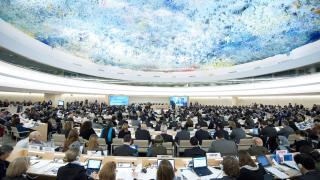
The UK has officially launched its election campaign for a seat on the UN Human Rights Council, for the 2014-16 term. The campaign, announced in Geneva yesterday by Senior Minister of State, Baroness Warsi, includes pledges to: protect the most vulnerable, respond to global challenges, further universal dignity and keep human rights at the core of the UN’s work.
As a non-member of the Council, the UK has been a highly active presence, engaging with member states on a number of key resolutions. The most recent session saw the extension of the mandate of the Commission of Inquiry on Syria, as well as a strengthening of the mandate of the Independent Expert on the Human Rights Situation in Sudan.
The election campaign calls for a strengthening of the Council and its mechanisms, something which the UK aims to encourage through leading by example. The UK is particularly keen to develop the Universal Periodic Review (UPR) process. UNA-UK recently submitted a follow-up to the UK’s UPR to the Joint Committee on Human Rights, encouraging the UK government to work towards some of the key recommendations.
The UK is also eager to increase its levels of engagement and collaboration, including working more closely with member states outside of the UK’s ‘traditional geographical groupings’. So-called ‘middle ground’ countries will be encouraged to build their capacity in human rights issues and to take more proactive positions. UNA-UK and partner NGOs work with the UK government on such issues through the Foreign & Commonwealth Office’s Human Rights Council Stakeholder Group, which meets prior to every Council session.
UNA-UK will be looking ahead to the 2012 Human Rights Council elections, due to take place in the General Assembly on 12-16 November, where currently the only competitive regional grouping is the Western European and Other States, which is fielding five candidates for three vacant seats, including the US which is seeking a second consecutive term on the Council. The four other regional groupings are all fielding ‘clean slates’ – the practice where the number of candidates fielded matches the number of seats available, often agreed by states in advance. This practice is contrary to the spirit of the General Assembly resolution stipulating Council election processes, which says that voting must ‘take into account candidates’ contribution to the promotion and protection of human rights’.






